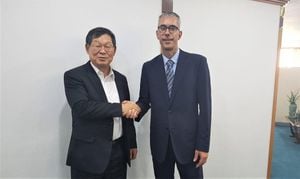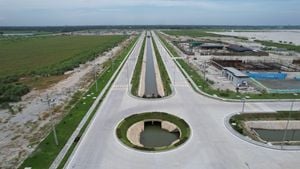Recent polling results have revealed significant insights about the political climate in Thailand, particularly concerning the Pheu Thai Party and the Bhumjaithai Party. The findings from the National Institute of Development Administration (NIDA Poll) and Suan Dusit Poll indicate growing public concern over party conflicts and the government's handling of economic issues.
According to NIDA Poll, conducted between February 17-18, 2025, involving 1,310 participants aged 18 and older from various regions, the results suggest nuanced perspectives on the conflict between these two major parties. Approximately 38.85% of respondents identified some level of conflict between Pheu Thai and Bhumjaithai, indicating these disagreements are not particularly serious. Meanwhile, 32.91% believe the conflict is significant but manageable. Conversely, 17.40% perceive no conflict whatsoever.
When asked about potential outcomes of this tension, the poll revealed divided opinions. About 38.09% foresee both parties reaching some form of compromise, allowing them to continue their coalition within the government. Meanwhile, others anticipate the disputes persisting, with different percentages predicting possible government reshuffles or even the dissolution of the House of Representatives.
Adding to this complex political environment, the Suan Dusit Poll—conducted online and through field surveys from February 18-21, 2025—gathered insights on the public's perception of the national economy. Of the 1,141 surveyed individuals, over half (51.01%) expressed the belief they must exercise more caution with their spending. The rising cost of living appears to be the most pressing issue, with 82.94% indicating it significantly hampers discretionary spending, leading many to accrue debt via credit cards and loans (42.68%).
Despite the government's attempts to inject funds to stimulate the economy, many respondents view these efforts as ineffective. A stark 69.50% believe the current measures are yielding no positive results, indicating widespread dissatisfaction and mistrust of economic policies.
Commenting on the polls, Pornpan Buathong, Director of Suan Dusit Poll, noted the urgency for Pheu Thai's government to regain public confidence, especially amid soaring prices of goods and services. She stressed the need for transparent communication and effective strategies to alleviate economic pressures.
The polls also explored hypothetical scenarios about former Prime Minister Thaksin Shinawatra's potential involvement. Respondents were divided; 41.63% envisioned no significant change should he intervene, whereas 34.18% were optimistic about potential improvements.
Political figures, especially within the realms of the Pheu Thai Party, are now under pressure as they face the dual challenges of addressing inter-party conflicts and responding to the electorate's economic concerns. Phuktham Vechaichanha, the Deputy Prime Minister and Minister of Defense, expressed confidence when speaking about Thaksin's recent visit to the conflict-ridden southern provinces. He emphasized collaboration among ASEAN nations could yield constructive outcomes and restore stability.
Despite previous incidents of violence, which included recent explosions, Phuktham reassured the public these occurrences should not deter progress. He aims to promote multicultural coexistence among Thais, Muslims, and Buddhists alike, asserting the necessity of peace for any long-lasting resolutions.
With current tensions influencing both political stability and the economy, it remains imperative for leaders to find common ground and assure citizens of their capability to navigate these challenges. Thaksin's vision for resolving southern unrest and the governing strategies for economic recovery will likely dominate headlines as Thailand approaches significant political decisions.
Looking forward, polls demonstrate not merely the current state of affairs but serve as indicators of the shifting public sentiment shaping Thailand's political future.



